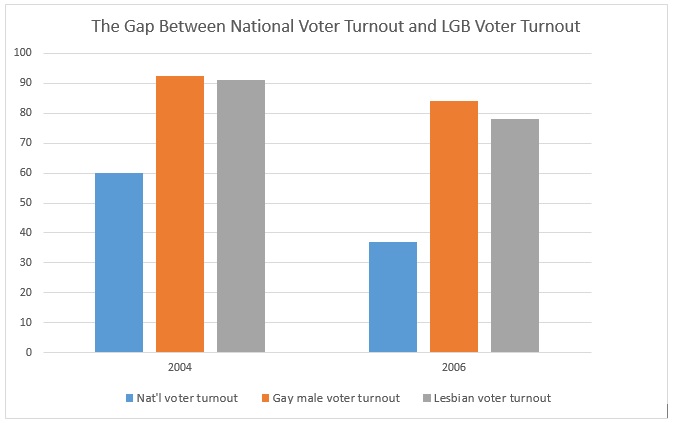The Huge Implications of Voting That No One Talks About
By:
It’s strange. When I talk to friends in my queer and trans circles about elections, the majority are earnest participants. Many campaign actively, and most show up at the polls on election day. When I talk to my straight, cisgender friends? Not so much.
This isn’t an irregularity. 2004 saw the biggest voter turnout since 1968 with around 60 percent of eligible Americans casting a ballot, but the number of gays and lesbians who reported voting in the 2004 race? Over 90 percent.
Looking at the 2006 midterms, the numbers tell a similar tale: overall voters dropped to a dismal 37 percent, but more than 3-in-4 LGB Americans say they voted. What’s driving the difference?

We aren't doing a credible job articulating how strongly election results impact the average person, particularly when Congress seems hopelessly deadlocked on basic issues.
While LGBTQ Americans frequently feel the direct repercussions of their vote - via their ability to marry the person they love or use a bathroom that corresponds to their gender identity - I imagine that non-LGBTQ people don’t feel the same direct line from their lives to the ballot box. If your equality isn’t being openly debated every week, it becomes harder to see the personal reasons to get out and vote.
So how can we show how strongly your vote matters? Presidential appointments.
If your eyes glaze over when you read “presidential appointments,” you’re not the only one. Why would I pick something so unsexy? With titles like the Under Secretary for Marketing and Regulatory Programs, it’s no wonder that many Americans don’t see the point. (Truth: I’m not even sure what that particular post does.)
But these appointments - which include Supreme Court justices, the Surgeon General, and the Secretary of State - are integral to setting policies that affect our daily lives. Beyond members of Congress and the President, the other political talking heads that we see on the news got there because of your vote. And when a polarized Congress seems incapable of even passing a budget, presidential appointees often take on bigger roles in addition to running the day-to-day operations of the government.
Care about your right to legally use medical marijuana? You should care about presidential appointments.
Surgeon General Vivek Murthy - a presidential appointee - made history when he came out in favor of medical pot for “certain medical conditions and symptoms” in Feb. 2015. And this appointee's words have put major pressure on Congress and the Deptartment of Justice to make a change, since either could update the antiquated 1970 law that places pot on par with heroin.
Another reason to be concerned about appointees if you care about pot? President Obama’s nominee to replace Eric Holder as attorney general is Loretta Lynch. And Lynch does not support the decriminalization of marijuana, which might rule out DoJ action. (Her response during confirmation hearings left little wiggle room: “Senator, I do not.”)
Care about how Ferguson was handled by the federal government? You should care about presidential appointments for this one, too.
In addition to his neutral stance on pot, outgoing Attorney General Eric Holder also plans to push for a new standard of proof for civil rights offenses. Holder recently said that adjusting the standards would “make the federal government a better backstop” against discrimination like that in Ferguson. (Right now, the standard of proof is too high and makes federal prosecution of deaths like Trayvon Martin’s difficult.) If you’re angry about the lack of prosecution in these cases, you should care who occupies this high-level, federal appointment.
What about employment protections for LGBTQ Americans? Or gender changes on US Passports? Or Net Neutrality? Same story.
While Congress sat on their hands for more than two decades on the Employment Non-Discrimination Act, the Equal Employment Opportunity Commission - helmed by no less than six presidential appointees - quietly took the lead Feb. 3. In a comprehensive field memo obtained by BuzzFeed, the agency “argues that LGBT job protections should be - and within the agency, already are - available under current law.” Taking steps to prevent gay and trans Americans from being fired for who they are is also integral to the EEOC’s 2012 “strategic enforcement plan.”
Similarly, ATTN has already talked about the ability of transgender individuals to update the gender on their passports. But did you know how this came about? A change in policy by the U.S. State Department, led by another appointee - Secretary of State Hillary Clinton.
You also have presidential appointees to thank for Net Neutrality. (There are five high-level appointees who are commissioners of the FCC.)
Your vote is directly related to all of these presidential appointments - and more than 3,000 others.
Presidential appointments may not be sexy, and neither are the mechanisms that regulate the process. (Most of the more than 3,000 appointments require Senate approval; just a scant 300 positions may be appointed by the U.S. President without Senate confirmation.) But when Capitol Hill seems embroiled in partisan squabbling, appointees move forward issues you care about - and often issues that are too hot for Congress to touch.
So, the next time you ask what your Senator or the President did for you, think about the thousands of appointees that control the policies that shape the minutia of your life. These appointments have large-scale impact, and the only way you can determine who they are is by voting for those who decide who gets the job.
You can stand up for yourself and others by registering to vote over at Ourtime.org.
